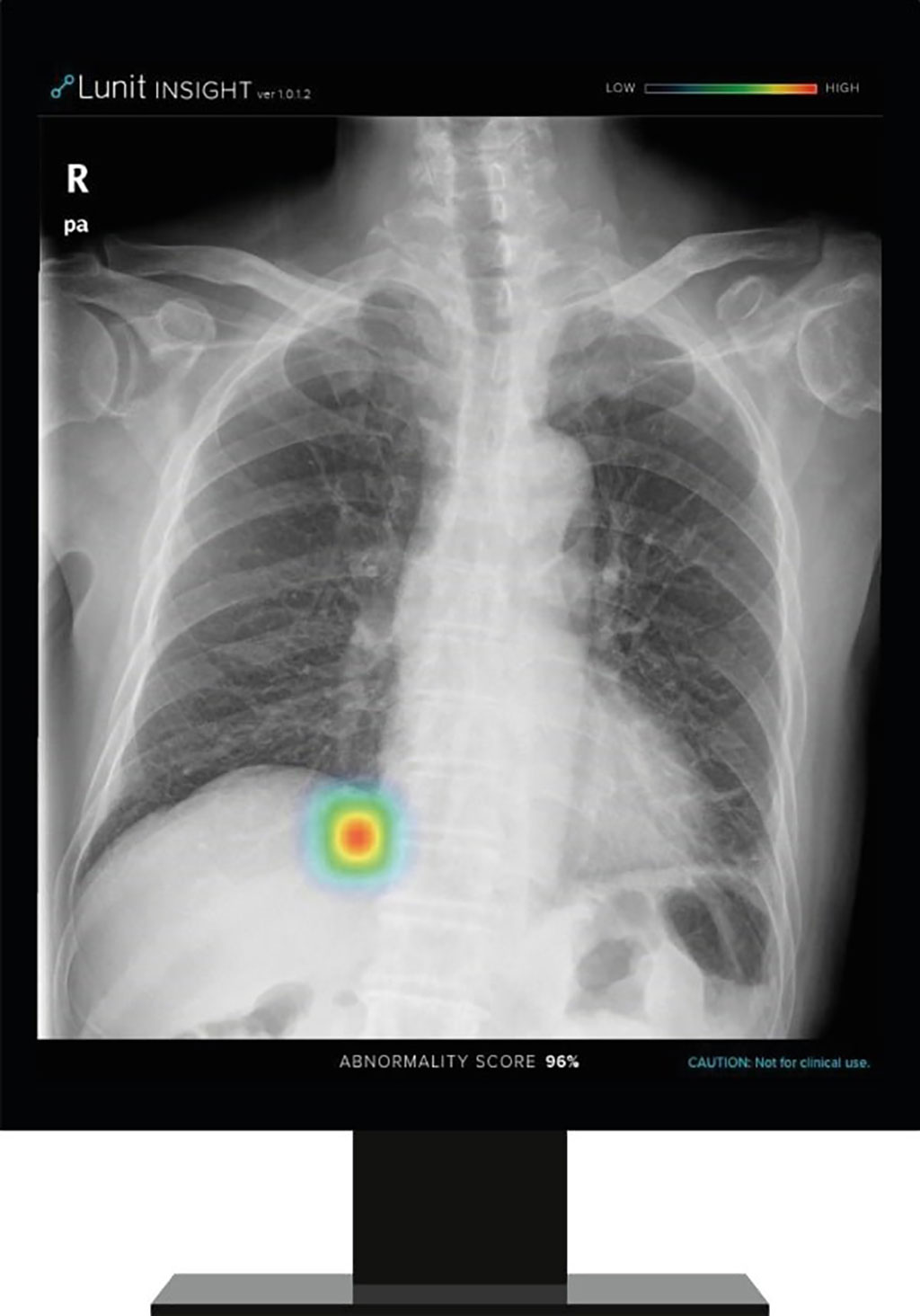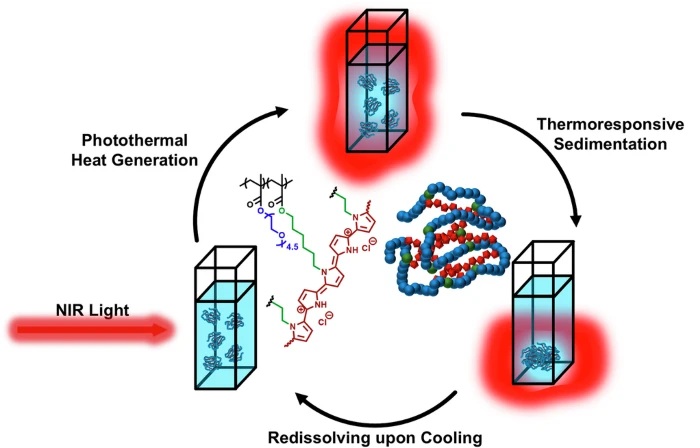New AI Software Accurately Detects Lung Cancers on X-Rays and Cuts Unnecessary Chest CT Scans by 30%
|
By MedImaging International staff writers Posted on 06 Aug 2021 |

Illustration
A recent study has shown that a deep learning-based artificial intelligence (AI) algorithm can improve the performance of readers in detecting lung cancers on chest radiographs.
According to the second joint study conducted by Massachusetts General Hospital (Boston, MA, USA) and Lunit Inc. (Seoul, Korea), AI had 28% sensitivity benefit for radiology residents, helping them properly recommend CT exams for potential lung cancer patients, and 30% specificity benefit for radiologists in lung cancer detection, reducing unnecessary CT exams. The joint research team has previously focused on validating the accuracy of AI, and proved that Lunit INSIGHT CXR, an AI software for analyzing chest X-rays, can accurately detect malignant pulmonary nodules, which can cause lung cancer. In this consecutive study, the team focused on whether AI can affect the performance of medical professionals in finding lung cancers.
For the study, 519 images of cancer-positive and cancer-negative patients were selected from the National Lung Screening Trial (NLST). Eight readers, including three radiology residents and five board-certified radiologists, participated in the reading. By comparing the analysis of the readers and Lunit INSIGHT CXR, the result showed that AI could lead to more efficient and precise diagnosis for both doctors and patients. With AI, radiology residents were able to recommend 28% more chest CT examinations for patients who may have potential risk of lung cancer. Also, radiologists recommended about 30% lesser proportion of unnecessary chest CT examinations in cancer-negative patients.
"The use of AI could help to detect pulmonary nodules accurately with chest X-rays, as well as reduce the need for unnecessary chest CT exams in some patients," said Mannudeep K. Kalra, MD, a radiologist at the MGH and Co-investigator on the study. "This finding can benefit patients by enabling them to avoid unneeded radiation exposure, and it can benefit the healthcare system by preventing certain medical costs."
"Chest X-ray is the firsthand diagnostic tool to detect lung cancer, but it has limitations as it is a compressed 2D rendering of 3D human structures," said Brandon Suh, CEO of Lunit. "An accurate analysis through Lunit INSIGHT CXR can help medical professionals provide diagnosis to patients with increased efficiency - preventing potential cancer at an early stage, while saving time and cost for those who do not need a further examination."
Related Links:
Massachusetts General Hospital
Lunit Inc.
According to the second joint study conducted by Massachusetts General Hospital (Boston, MA, USA) and Lunit Inc. (Seoul, Korea), AI had 28% sensitivity benefit for radiology residents, helping them properly recommend CT exams for potential lung cancer patients, and 30% specificity benefit for radiologists in lung cancer detection, reducing unnecessary CT exams. The joint research team has previously focused on validating the accuracy of AI, and proved that Lunit INSIGHT CXR, an AI software for analyzing chest X-rays, can accurately detect malignant pulmonary nodules, which can cause lung cancer. In this consecutive study, the team focused on whether AI can affect the performance of medical professionals in finding lung cancers.
For the study, 519 images of cancer-positive and cancer-negative patients were selected from the National Lung Screening Trial (NLST). Eight readers, including three radiology residents and five board-certified radiologists, participated in the reading. By comparing the analysis of the readers and Lunit INSIGHT CXR, the result showed that AI could lead to more efficient and precise diagnosis for both doctors and patients. With AI, radiology residents were able to recommend 28% more chest CT examinations for patients who may have potential risk of lung cancer. Also, radiologists recommended about 30% lesser proportion of unnecessary chest CT examinations in cancer-negative patients.
"The use of AI could help to detect pulmonary nodules accurately with chest X-rays, as well as reduce the need for unnecessary chest CT exams in some patients," said Mannudeep K. Kalra, MD, a radiologist at the MGH and Co-investigator on the study. "This finding can benefit patients by enabling them to avoid unneeded radiation exposure, and it can benefit the healthcare system by preventing certain medical costs."
"Chest X-ray is the firsthand diagnostic tool to detect lung cancer, but it has limitations as it is a compressed 2D rendering of 3D human structures," said Brandon Suh, CEO of Lunit. "An accurate analysis through Lunit INSIGHT CXR can help medical professionals provide diagnosis to patients with increased efficiency - preventing potential cancer at an early stage, while saving time and cost for those who do not need a further examination."
Related Links:
Massachusetts General Hospital
Lunit Inc.
Latest Radiography News
- AI Detects Early Signs of Aging from Chest X-Rays
- X-Ray Breakthrough Captures Three Image-Contrast Types in Single Shot
- AI Generates Future Knee X-Rays to Predict Osteoarthritis Progression Risk
- AI Algorithm Uses Mammograms to Accurately Predict Cardiovascular Risk in Women
- AI Hybrid Strategy Improves Mammogram Interpretation
- AI Technology Predicts Personalized Five-Year Risk of Developing Breast Cancer
- RSNA AI Challenge Models Can Independently Interpret Mammograms
- New Technique Combines X-Ray Imaging and Radar for Safer Cancer Diagnosis
- New AI Tool Helps Doctors Read Chest X‑Rays Better
- Wearable X-Ray Imaging Detecting Fabric to Provide On-The-Go Diagnostic Scanning
- AI Helps Radiologists Spot More Lesions in Mammograms
- AI Detects Fatty Liver Disease from Chest X-Rays
- AI Detects Hidden Heart Disease in Existing CT Chest Scans
- Ultra-Lightweight AI Model Runs Without GPU to Break Barriers in Lung Cancer Diagnosis
- AI Radiology Tool Identifies Life-Threatening Conditions in Milliseconds

- Machine Learning Algorithm Identifies Cardiovascular Risk from Routine Bone Density Scans
Channels
MRI
view channel
Novel Imaging Approach to Improve Treatment for Spinal Cord Injuries
Vascular dysfunction in the spinal cord contributes to multiple neurological conditions, including traumatic injuries and degenerative cervical myelopathy, where reduced blood flow can lead to progressive... Read more
AI-Assisted Model Enhances MRI Heart Scans
A cardiac MRI can reveal critical information about the heart’s function and any abnormalities, but traditional scans take 30 to 90 minutes and often suffer from poor image quality due to patient movement.... Read more
AI Model Outperforms Doctors at Identifying Patients Most At-Risk of Cardiac Arrest
Hypertrophic cardiomyopathy is one of the most common inherited heart conditions and a leading cause of sudden cardiac death in young individuals and athletes. While many patients live normal lives, some... Read moreUltrasound
view channel
Wearable Ultrasound Imaging System to Enable Real-Time Disease Monitoring
Chronic conditions such as hypertension and heart failure require close monitoring, yet today’s ultrasound imaging is largely confined to hospitals and short, episodic scans. This reactive model limits... Read more
Ultrasound Technique Visualizes Deep Blood Vessels in 3D Without Contrast Agents
Producing clear 3D images of deep blood vessels has long been difficult without relying on contrast agents, CT scans, or MRI. Standard ultrasound typically provides only 2D cross-sections, limiting clinicians’... Read moreNuclear Medicine
view channel
PET Imaging of Inflammation Predicts Recovery and Guides Therapy After Heart Attack
Acute myocardial infarction can trigger lasting heart damage, yet clinicians still lack reliable tools to identify which patients will regain function and which may develop heart failure.... Read more
Radiotheranostic Approach Detects, Kills and Reprograms Aggressive Cancers
Aggressive cancers such as osteosarcoma and glioblastoma often resist standard therapies, thrive in hostile tumor environments, and recur despite surgery, radiation, or chemotherapy. These tumors also... Read more
New Imaging Solution Improves Survival for Patients with Recurring Prostate Cancer
Detecting recurrent prostate cancer remains one of the most difficult challenges in oncology, as standard imaging methods such as bone scans and CT scans often fail to accurately locate small or early-stage tumors.... Read moreGeneral/Advanced Imaging
view channel
New Algorithm Dramatically Speeds Up Stroke Detection Scans
When patients arrive at emergency rooms with stroke symptoms, clinicians must rapidly determine whether the cause is a blood clot or a brain bleed, as treatment decisions depend on this distinction.... Read more
3D Scanning Approach Enables Ultra-Precise Brain Surgery
Precise navigation is critical in neurosurgery, yet even small alignment errors can affect outcomes when operating deep within the brain. A new 3D surface-scanning approach now provides a radiation-free... Read moreImaging IT
view channel
New Google Cloud Medical Imaging Suite Makes Imaging Healthcare Data More Accessible
Medical imaging is a critical tool used to diagnose patients, and there are billions of medical images scanned globally each year. Imaging data accounts for about 90% of all healthcare data1 and, until... Read more
Global AI in Medical Diagnostics Market to Be Driven by Demand for Image Recognition in Radiology
The global artificial intelligence (AI) in medical diagnostics market is expanding with early disease detection being one of its key applications and image recognition becoming a compelling consumer proposition... Read moreIndustry News
view channel
GE HealthCare and NVIDIA Collaboration to Reimagine Diagnostic Imaging
GE HealthCare (Chicago, IL, USA) has entered into a collaboration with NVIDIA (Santa Clara, CA, USA), expanding the existing relationship between the two companies to focus on pioneering innovation in... Read more
Patient-Specific 3D-Printed Phantoms Transform CT Imaging
New research has highlighted how anatomically precise, patient-specific 3D-printed phantoms are proving to be scalable, cost-effective, and efficient tools in the development of new CT scan algorithms... Read more
Siemens and Sectra Collaborate on Enhancing Radiology Workflows
Siemens Healthineers (Forchheim, Germany) and Sectra (Linköping, Sweden) have entered into a collaboration aimed at enhancing radiologists' diagnostic capabilities and, in turn, improving patient care... Read more



















